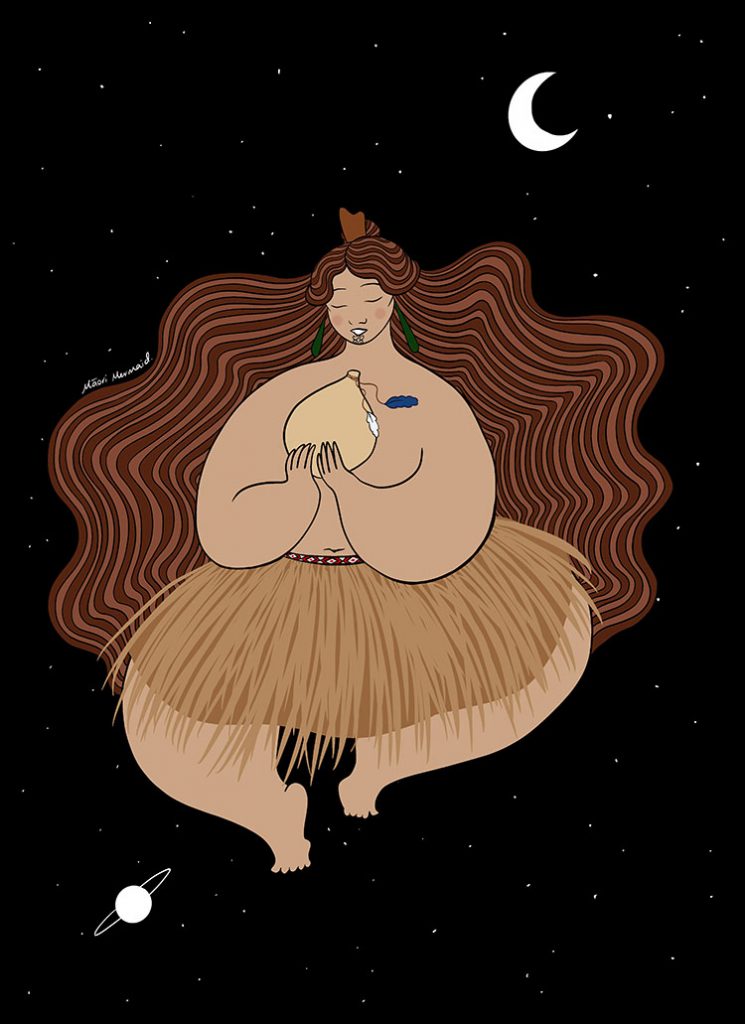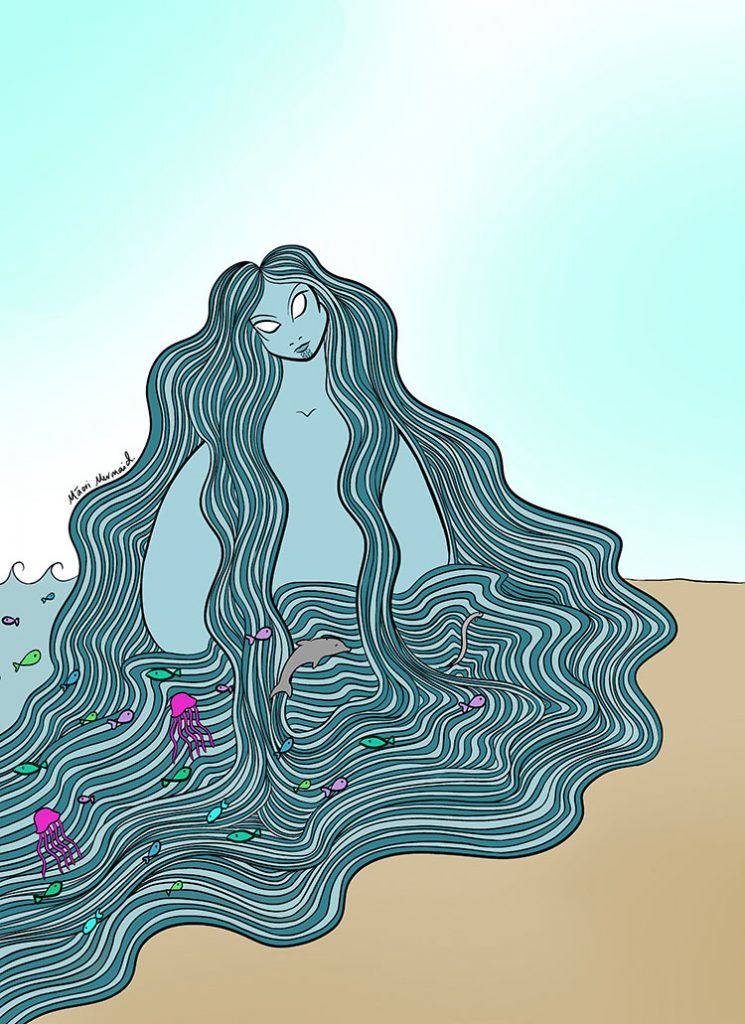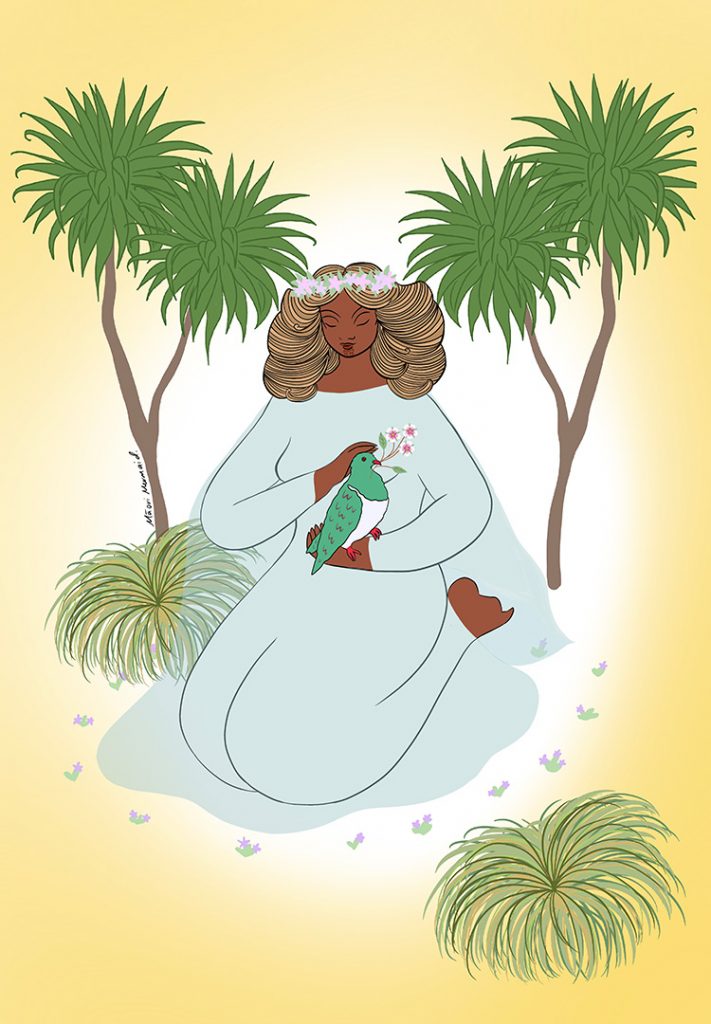A Conceptual Framework
tuhia ki te rangi,
tuhia ki te whenua,
tuhia ki te ngAkau.
Write it through the heavens, inscribe in the lands, and carve it in our hearts.
We serve our English teaching community through the advocacy, promotion and support of teachers of English in Aotearoa New Zealand. Through this conceptual framework, the mauri (the lifeforce) of our work will be strengthened through our collective philosophy.
Pūrākau or storytelling is at the centre of the human experience. It is how culture is sustained, celebrated, revitalised and remembered. Through the teaching of English, we are cognisant of our responsibility to empower stories that weave together land and people. Our responsibility to mana ōrite (equality) for mātauranga Māori is deeply embedded in this conceptual framework.



The images were created by Māori Mermaid (Ngāpuhi, Ngāti Ruanui, Ngāruahine). Other works by this artist can be found on Instagram (@maori_mermaid).
Pou Tahi: Whakatuarā
ADVOCACY
Te hā o Hine-pū-te-hue
(The essence of Hine-pū-te-hue)
Hine-pū-te-hue is the goddess of the hue (gourd). The gods and goddesses were at war following the separation of their primordial parents. To calm their fury, Hine-pū-te-hue breathed in the fury from the war, infused it with love and then breathed this love into the world. Her essence permeates our advocacy work.
We foster meaningful collaboration between our regional teachers’ Associations. We work alongside our communities to highlight issues and concerns. We recognise our collective responsibility to sustain our indigenous culture through the work we do.


Pou Rua: Whakawhanake
PROMOTION
Te hā o Hine-moana
(The essence of Hine-moana)
Pou Toru: Whakawhirinaki
SUPPORT
Te hā o Hine-raumati (The essence of Hine-raumati)
Hine-raumati is the goddess of summertime. She supports the work of Papatūānuku – the earth mother – to sustain life on earth. She has a symbiotic relationship with Hine-takurua, the goddess of wintertime to support the annual seasonal revolution. We support the work of the teachers of English and related communities in the same way.
We share new and relevant literature connected to English teaching. We validate both written and oral bodies of knowledge, thus rightfully providing space for indigenous ways of knowing. We share and disseminate knowledge to our communities through a range of accessible platforms. Our events offer opportunities to grow and share knowledge.

The Story of Te Tuhi Māreikura
Holding space for our ākonga to be their authentic selves is one of the most important roles we have as teachers of English. To do this, we must always develop our cultural capability and responsiveness and ensure the environments within which we work are culturally sustaining.
As a subject association we recognise our role in challenging the dominant cultural norms and narrow world views which may exist within our sector. This understanding led us to the creation of Te Tuhi Māreikura, a conceptual framework from which to consider all our mahi as a subject association.
In 2018 the Ministry of Education released its NCEA change package with seven key principle shifts. Of tremendous importance to all was mana ōrite mō te mātauranga Māori, the most explicit commitment in the history of education in New Zealand to creating culturally sustaining learning environments.
The NZATE council immediately looked to the resources and professional learning and development opportunities we would need to create in response. Our discussions identified our different contexts, skills and confidence when it came to leading this important mahi.
This led us to our powerful and beautiful mahi with Joni Angeli-Gordon (Ngāpuhi, Ngāti Whātua). Joni, now a consultant and facilitator in Māori mindfulness and in teacher education (mauriaroha.co.nz), was a secondary school teacher for 11 years in both English-medium and Kura Kaupapa Māori. She is also currently a PhD candidate through the University of Waikato.
In January 2021 a small group of council members met with Joni to discuss who we are as an organisation and how we might best support mana ōrite mō te mātauranga Māori. It was clear in this hui, and in kōrero that followed, that there was, and continues to be, so much we want to achieve and so much that we have to consider, reconsider and deconsider as a part of our individual and collective learning journeys. There was a need to have an agreed kaupapa that grounded our mahi and kept our waka afloat and in the right direction.
From those discussions the notion of a framework, to guide and provide reference to current and future councils, emerged. As teachers of literature and language we were drawn to the notion of pūrākau—stories and storytelling—and Joni offered the theme of atua wāhine to reflect this. Ngā Pou Tarāwaho became the working title of the framework.
We met with Joni again in April of 2021, but this time as a full council and with those committee members who are based in Auckland. Joni shared the draft framework she had prepared following our January hui. Led by Joni, we explored kaupapa Māori principles and what equality for mātauranga Māori might look like in our classrooms. There were discussions about ako (culturally preferred pedagogy) and taonga tuku iho (cultural aspirations) as well as the importance of ata (growing respectful relationships). During this hui we looked at, and agreed on, the final wording of this framework.
This conceptual framework—Te Tuhi Māreikura— is a place to which to return as learners and leaders. It provides us with core principles that allow us to both guide and critique our mahi. It is a powerful foundational document to support our own growth and transformation as a council.
The final name was suggested to us by Joni. Tuhi Māreikura is a marking of ochre on the forehead of wāhine which connects to our goddess theme. Tuhi also means to write, draw and create.
The images were created by Māori Mermaid (Ngāpuhi, Ngāti Ruanui, Ngāruahine). Other works by this artist can be found on Instagram (@maori_mermaid).


